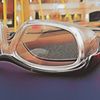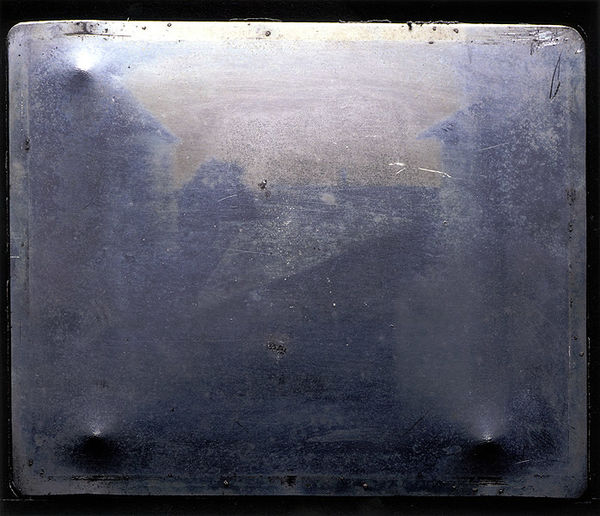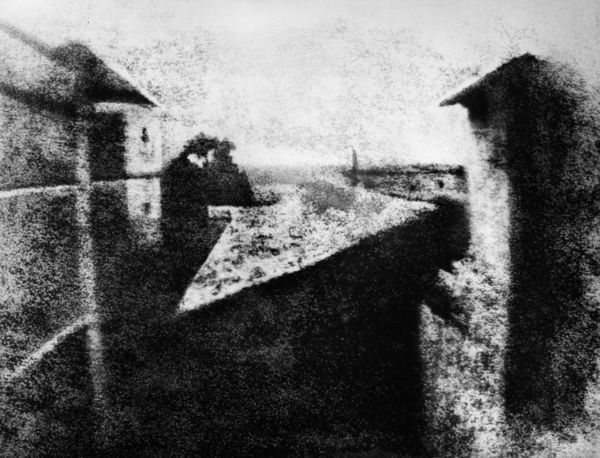Film vs memory card (digital)
Apr 23, 2018 13:07:55 #
TheShoe
Loc: Lacey, WA
I like the fact that with digital, I have complete control over the process from tripping the shutter to final print. During the film days, I was at the mercy of the lab for the PP phase because I did not have space or money needed to install my own darkroom.
Apr 23, 2018 13:12:55 #
Personally, I don't see an issue with grain. It's part of the process. It always has been and always will be, including digital.
--Bob
--Bob
Fotoartist wrote:
You people have not been paying attention the past 15 years. I made this test in 2003 when digital cameras were a lot more inferior to what they are now and digital beat film even back then in my opinion! Test with Nikon D100 film camera and Fuji S-3 digital. Notice the film grain in the abdomen region which is a lot harder to take out than noise. Indoors with ISO 400 film.
Apr 23, 2018 13:20:03 #
akxss825 wrote:
A question I have always wondered about as a very ... (show quote)
I still shoot a lot of film and to me it is at this point in time still unsurpassed in image quality and probably will never be surpassed by digital!
Apr 23, 2018 13:20:05 #
I shoot both film and digital. I guess I'm old school, but I still prefer film (exclusively B&W) in part because I enjoy working in my darkroom. I find it curious that some would think film limits your experimentation. I have been developing film and printing for 30 years with varying degrees of success, and still have not experimented with all the printing techniques available to B&W film practitioners, i.e. Bromoil, Carbon Black, Cyanotype, Vandyke Brown and others. I recognize that not everyone wants to work in a darkroom - good for them. As for cost of film vs digital photography: I still am using much of the equipment, camera and darkroom, that I have had for at least 25 years. I do not still own the same computer or post processing software that I had 3 years ago; for me film is cheaper than digital. On the plus side for digital, I have saved several badly scratched negatives via scanning and creating paper negatives. Beautiful images are what I strive for and occasionally accomplish be the format film or digital.
Apr 23, 2018 13:31:43 #
I think it (grain) looks like little worms crawling around the surface.
rmalarz wrote:
Personally, I don't see an issue with grain. It's part of the process. It always has been and always will be, including digital.
--Bob
--Bob
Apr 23, 2018 13:36:00 #
rmalarz wrote:
Yeah, I know what you mean. I have an old Gitzo. I purchased it about 18 years ago. I converted it to be useable for both my film and digital cameras. Works really great.
--Bob
--Bob
I have never heard of such a thing that one had to convert a tripod to be useable for digital cameras, I still have and use tripods, that are over 50 years old, and they work just fine with both, (no conversion, to what anyway)!
Apr 23, 2018 13:59:35 #
drklrd wrote:
Film still has higher resolution because it has tiny grains of silver salts in it vs digital noise especially at high ISO numbers but the newest Nikon D850 might be the solution to equal it out. Unless in B&W they fix the grey scale to larger than 250 film will always be better definition for B&W.
My testing in 2003 showed that a 6mp scan preserved all the detail I was capturing on Kodachrome, and when I went back to Pentax 34 months ago I used the same lens used to take the Kodachrome slides and established that it could do better - so it was not the weak link in that process.
Apr 23, 2018 14:14:41 #
Retina
Loc: Near Charleston,SC
speters wrote:
I think he meant the conversion would be changing out the tripod's lens holder accessory, the thing that screws on top, from a film type to an electronic one.I have never heard of such a thing that one had to convert a tripod to be useable for digital cameras, I still have and use tripods, that are over 50 years old, and they work just fine with both, (no conversion, to what anyway)!
Apr 23, 2018 14:15:50 #
ballsafire
Loc: Lafayette, Louisiana
jerryc41 wrote:
It's more about the particular film and the particular digital lens/camera combination. Both systems can produce excellent results - or junk.
I think jerryc41 has covered this subject nicely. Just compare Sony cameras with Canon cameras--one takes nice light bluish pictures while Canon takes darker photos. Kodak takes more colorful photos -- etc. You can adjust the type of color you "want or need" within the camera, too. So, I don't worry about whether film or digital is best -- right now we are in the digital age and it is working beautifully.
Apr 23, 2018 15:07:30 #
I see absolutely no reason to go back to film, ever. The only thing my film cameras are good for are props in digital images. Like many others, I think digital is at or surpassing the quality of film in prosumer camera bodies.
For me, economics are the major factor. I just checked the image reference numbers on my bodies. Last year I shot right at 16,000 images. that equates to 444 rolls of 36 exposure rolls of 35mm. At 3.50 a roll that's $1500 for film. To develop and scan that film to digital at 0.17 per frame would cost about $2700 for a grand total around $4200. The wear and tear on the equipment would be about the same although with digital bodies I don't have to open my camera to get the film out which is a plus, less likely to damage a shutter and introduce dirt.
That cost estimate is conservative and that's before printing anything. Even when I was developing my own 35mm film, I would have spent a couple hundred dollars on chemicals and in developing 444 rolls I would have botched several. Before I quit shooting film I was paying about $1.50 a roll for "develop only" for 36 exposure rolls.
Now would I have shot 16,000 images if I was paying to develop all that film? Hell no. Being an amateur I think the most I ever shot in one year before I started shooting digital was about 100 rolls of film, a couple rolls a week.
Another thing with 35mm film is you're locked into the ISO of the film (per roll). If you were shooting something and the wrong film was in the camera you rolled it up before it was completely exposed and wasted the remainder of the roll.
With digital You can also process every image as black and white AND color.
It's counter intuitive but there's also a big cost savings in printing. With non-destructive editing you can get the photo exactly how you want it before you commit it to paper. It beats the hell out of dodging and burning and then waiting for the image to develop and see if you got it right. It was not uncommon for me to print a handful of 8x10s to try and get things where I wanted and to practice for a larger print. Many times I still botched the big ones.
For me, economics are the major factor. I just checked the image reference numbers on my bodies. Last year I shot right at 16,000 images. that equates to 444 rolls of 36 exposure rolls of 35mm. At 3.50 a roll that's $1500 for film. To develop and scan that film to digital at 0.17 per frame would cost about $2700 for a grand total around $4200. The wear and tear on the equipment would be about the same although with digital bodies I don't have to open my camera to get the film out which is a plus, less likely to damage a shutter and introduce dirt.
That cost estimate is conservative and that's before printing anything. Even when I was developing my own 35mm film, I would have spent a couple hundred dollars on chemicals and in developing 444 rolls I would have botched several. Before I quit shooting film I was paying about $1.50 a roll for "develop only" for 36 exposure rolls.
Now would I have shot 16,000 images if I was paying to develop all that film? Hell no. Being an amateur I think the most I ever shot in one year before I started shooting digital was about 100 rolls of film, a couple rolls a week.
Another thing with 35mm film is you're locked into the ISO of the film (per roll). If you were shooting something and the wrong film was in the camera you rolled it up before it was completely exposed and wasted the remainder of the roll.
With digital You can also process every image as black and white AND color.
It's counter intuitive but there's also a big cost savings in printing. With non-destructive editing you can get the photo exactly how you want it before you commit it to paper. It beats the hell out of dodging and burning and then waiting for the image to develop and see if you got it right. It was not uncommon for me to print a handful of 8x10s to try and get things where I wanted and to practice for a larger print. Many times I still botched the big ones.
Apr 23, 2018 15:21:53 #
bpulv
Loc: Buena Park, CA
PhotoFem wrote:
In my humble opinion, I think that film has not on... (show quote)
Regarding the "longevity" of digital, I disagree with you because what you are describing is the poor archival quality of jpg and other compressed formats.
If archival quality is required, the RAW format file will theoretically maintain its original quality forever as long as digital storage is available in one format or another. RAW files can be copied from one format to another without data loss. Therefore, if the original RAW image was on an SD card, for example, and that file was copied to a hard drive, which was copied to a CDROM and from one type of media to another including a type of digital media in the future that has not even been invented yet, it will maintain its original integrity and quality as long as it is copied to a new media type before one of the intervening media has become degraded. Since digital photography is relatively new, this can only be considered a theory that will take at least one or two-hundred years to prove or disprove.
The oldest photograph taken by Joseph Nicacphore Niacpce in 1826 or 1827 has survived, BUT its quality is highly degraded AND it only represents the technology of its time. Since then there have been many different film type processes and each has its own timeline. Although very old film images have lasted so far, we don't know if they will all survive another one-hundred, two-hundred or three-hundred years into the future because there is always some change with time of chemical processes.
Apr 23, 2018 15:39:13 #
I have complete control over the entire process with film, as well as digital, even before "tripping the shutter". I rarely chimp, as I know what my image is going to look like before making the exposure.
It costs me a total of approximately $0.15 per exposure and I get 640 exposures per roll of bulk 35mm. That equates to approximately 21973 exposures for the cost of a D850. All in all, film is quite inexpensive. Both film and digital have their own indispensable strong points to add to photography.
--Bob
It costs me a total of approximately $0.15 per exposure and I get 640 exposures per roll of bulk 35mm. That equates to approximately 21973 exposures for the cost of a D850. All in all, film is quite inexpensive. Both film and digital have their own indispensable strong points to add to photography.
--Bob
TheShoe wrote:
I like the fact that with digital, I have complete control over the process from tripping the shutter to final print. During the film days, I was at the mercy of the lab for the PP phase because I did not have space or money needed to install my own darkroom.
Apr 23, 2018 15:43:13 #
PhotoFem wrote:
However, when the card is over-written a number of time...the quality of image capture drops off considerably.
Have you actually seen this? A card can become corrupted or worn out and simply stop working but typically a memory card is good for many, many thousands of cycles. In fact so many that most cards are simply thrown away in favor of a new and larger card. Cards do not gradually give worse results than when new however. That is the beauty of working digitally where the information is in simple bytes of digital data. If anything, film (negatives, slides) loose their color and fidelity just sitting over a period of time.
Digital imagery has so long ago surpassed the quality of film that most everyone has converted to digital. The expense of film and processing has skyrocketed too. The analog look of film is still popular with many which is understandable, just as a lot of people still prefer the sound of a record to that of a CD. The film look can be duplicated digitally to a large extent if so desired.
Apr 23, 2018 15:59:16 #
speters wrote:
I have never heard of such a thing that one had to convert a tripod to be useable for digital cameras, I still have and use tripods, that are over 50 years old, and they work just fine with both, (no conversion, to what anyway)!
Forgive me for laughing, but has "sarcasm" not made it's way to Idaho yet?
Apr 23, 2018 16:13:17 #
rmalarz wrote:
I have complete control over the entire process wi... (show quote)
Yes, there are economies in shooting bulk film but you're equating the cost of film developing to the cost of a camera which is a non-sequitur. You can use a couple of $20 dollar SD cards to capture all the images a body will produce until it wears out. You can take a cheap digital body and put a great lens on it, and shoot in manual. You don't have to have a fantastic body to get great digital images. The 24mp D3300 can be had for $400 dollars. Shoot till you wear it out and buy the next Nikon at that price point. Need to shoot FX and use those old lenses, buy a used 700 and wear that out.
Without a doubt the one thing you can say about film is it separates those who understand photography from those who don't. Digital is easier and much more forgiving.
Even if you're an old hand at developing you will occasionally screw up a roll. Will that be the roll that didn't matter too much, or the roll that mattered a whole lot? If you're just getting started with film, you'll screw up quite a few rolls. Also color adds a degree of difficulty to developing your own film that most people are not willing to learn.
If you want to reply, then register here. Registration is free and your account is created instantly, so you can post right away.







